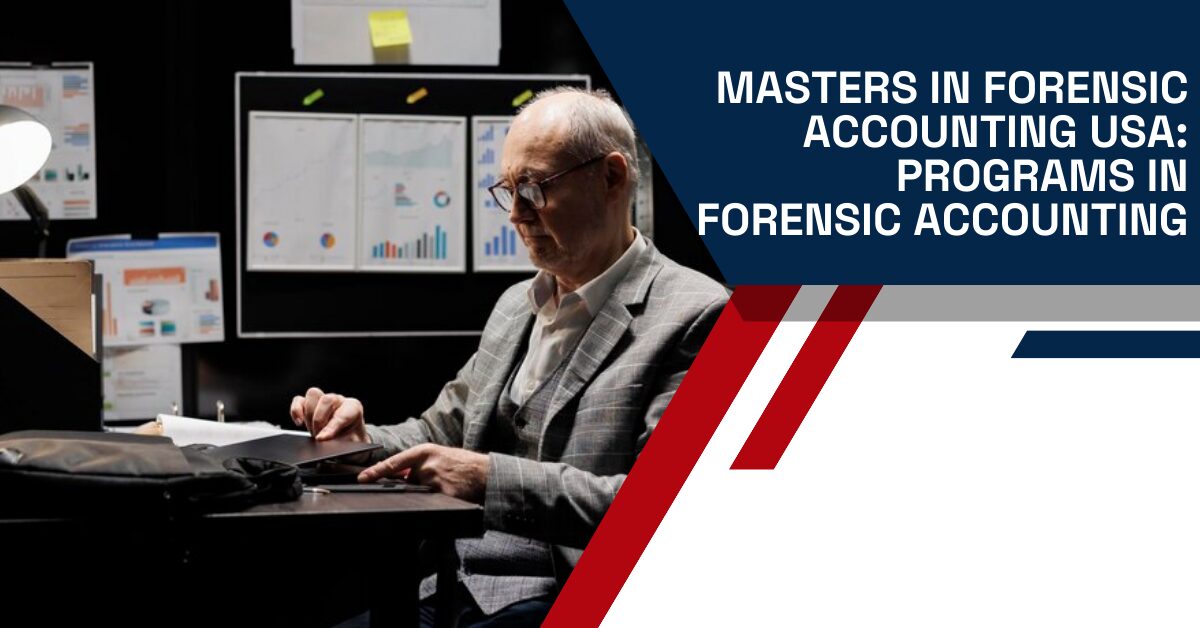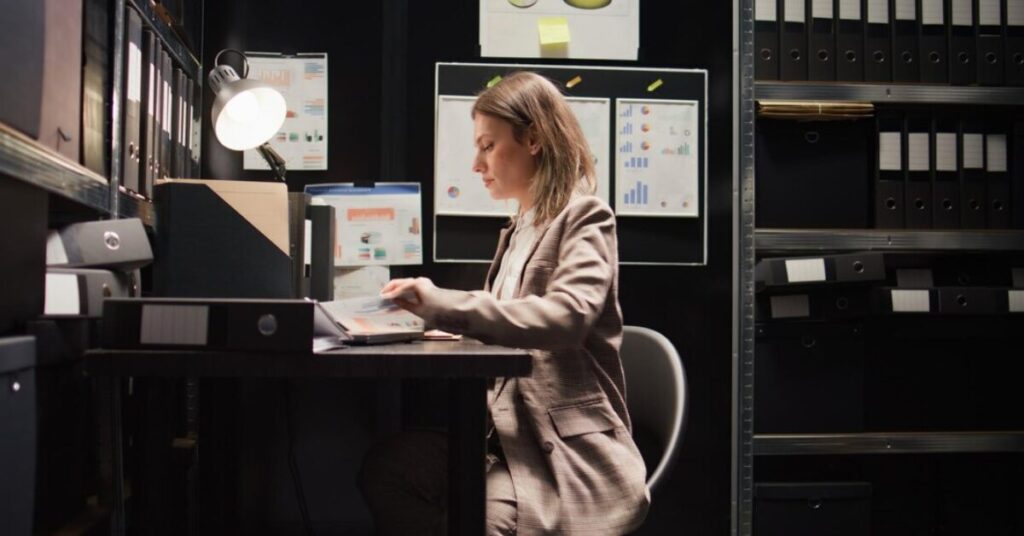17 December 2024
6 minutes read
Masters in Forensic Accounting USA: Programs in Forensic Accounting

Key Takeaways
- Forensic accounting offers exciting roles in investigating financial fraud and irregularities.
- Graduate programs provide comprehensive training, preparing you for lucrative careers in the field.
- Certification and advanced degrees enhance job prospects and salary potential in this specialized area.
Did you know that over 70% of people give up on their goals because they don’t have a solid plan? That’s a huge number, and it really shows how common it is to start something with excitement, only to lose steam later on. Whether it’s hitting career targets, getting fit, or working on personal projects, we’ve all been there—motivated at first, then stuck and unsure of what to do next. This is where a Masters in Forensic Accounting USA comes to play.
The main problem is not knowing where to begin or how to keep going. It can feel like you’re drowning in advice or too scared to make a move. But here’s the good news: you can change this. With a few realistic steps and some solid support, you can get back on track. It’s all about having a clear plan and taking small, manageable actions that keep you moving forward.
What is Master of Forensic Accounting?

White-collar crime costs the global economy billions each year. With such high stakes, the demand for skilled forensic accountants is skyrocketing. A Master of Science in Forensic Accounting is a specialized degree that trains individuals to detect, investigate, and prevent financial fraud. This program dives deep into areas like fraud examination, money laundering, and internal auditing, preparing graduates to tackle complex financial crimes.
Forensic accountants play a critical role in analyzing financial statements and uncovering irregularities that point to fraud. The journey to becoming a certified fraud examiner typically begins with an undergraduate degree in accounting, followed by specialized courses in forensic accounting.
Many programs, including those accredited by the Association to Advance Collegiate Schools of Business, offer a 30-credit program that includes both general accounting and forensic-focused subjects. Graduates often pursue CPA licensure and certification as fraud examiners, which opens doors to careers in public accounting, internal auditing, and financial crime investigation.
What to Expect From Graduate Forensic Accounting College Programs in USA
Choosing a graduate program can be daunting, especially in a specialized field like forensic accounting. If you’re aiming to become a certified public accountant (CPA) with a focus on financial crime, understanding what to expect from these programs is crucial. Graduate forensic accounting programs in the USA offer a rigorous curriculum that includes advanced accounting courses, financial reporting, and forensic examination techniques.
Admission requirements typically include an undergraduate degree in accounting or a related field, along with a solid GPA and possibly some work experience. Many programs are designed to prepare students for the CPA exam and licensure in New York and other states. Accredited by the Association of Certified Fraud Examiners and other professional bodies, these programs ensure that graduates are well-equipped to meet the demands of the industry. Expect a blend of theoretical knowledge and practical skills, with a focus on detecting, investigating, and preventing financial fraud.
Top 10 Universities Offering Masters in Forensic Accounting in USA
Here’s a list of the top 10 universities in the USA offering master’s programs in forensic accounting, providing specialized education and accreditation for aspiring forensic accountants.
| University | Program Name | Location | Accreditation |
|---|---|---|---|
| University of Texas at Austin | Master in Professional Accounting (MPA) | Austin, TX | AACSB |
| University of Southern California (USC) | Master of Accounting with Forensic Analytics | Los Angeles, CA | AACSB |
| Bentley University | MS in Accounting (Forensic Accounting Focus) | Waltham, MA | AACSB |
| Northeastern University | MS in Accounting (Forensic Accounting Track) | Boston, MA | AACSB |
| Florida Atlantic University | Master of Accounting (Forensic Accounting) | Boca Raton, FL | AACSB |
| West Virginia University | MS in Forensic & Fraud Examination | Morgantown, WV | AACSB |
| University of New Haven | MS in Forensic Accounting | West Haven, CT | AACSB |
| La Salle University | MS in Economic Crime Forensics | Philadelphia, PA | AACSB |
| Oklahoma State University | MS in Accounting (Forensic Accounting) | Stillwater, OK | AACSB |
| SUNY Albany | MS in Forensic Accounting | Albany, NY | AACSB |
Admissions Process

Applying for a master’s in forensic accounting requires a few key steps to ensure you meet all educational and program-specific requirements.
Step 1: Research and Choose Programs
Start by researching the best programs for a master’s in forensic accounting, including both traditional on-campus and online MS options. Focus on graduate programs from accredited business schools and programs.
Step 2: Meet Education Requirements
Ensure you have a bachelor’s degree in accounting or a related field. Your undergraduate accounting coursework should provide a strong foundation in business and accounting principles. Some programs may also require relevant experience in accounting or the financial industry.
Step 3: Prepare Application Materials
Gather your application materials:
- Transcripts: Provide transcripts from your undergraduate degree from a regionally accredited institution.
- Letters of Recommendation: Obtain letters from professors or professionals in the accounting industry.
- Statement of Purpose: Write a compelling statement outlining your interest in forensic accounting and career goals.
- Resume: Highlight your experience in accounting, particularly any work related to financial crimes and management.
Step 4: Standardized Tests
Some programs may require GRE or GMAT scores. Check the specific admission requirements of each program you are applying to.
Step 5: Application Submission
Complete the online application for each program, ensuring all required documents and information are submitted by the deadline.
Step 6: Financial Aid and Scholarships
Explore financial aid options and scholarships offered by business schools and programs to help offset tuition and other expenses.
Step 7: Acceptance and Enrollment
Once accepted, follow the enrollment instructions provided by the program. This may include submitting a deposit, registering for classes, and attending orientation sessions. Ensure the program meets licensure requirements if you plan to pursue CPA licensure, such as in New York.
Forensic Accounting Jobs and Salaries
Forensic accounting is a specialized field of accounting that focuses on investigating and analyzing financial records to identify irregularities in financial activities. Graduates from forensic accounting graduate programs often find themselves well-prepared for a variety of roles within this field, thanks to the comprehensive accounting and accounting research skills they develop.
Job Opportunities
After completing a master’s in forensic accounting program, graduates can pursue roles such as forensic accountants, fraud examiners, and internal auditors. These professionals work in various settings, including accounting firms, corporations, and government agencies. Their primary tasks involve detecting and investigating fraudulent financial activities, providing litigation support, and conducting forensic accounting research.
Salaries
The financial rewards in forensic accounting are substantial. According to industry data, entry-level positions for those with a master’s degree can start around $60,000 to $80,000 per year. With experience, salaries can rise significantly, often exceeding $100,000 annually for senior roles. The field of accounting values those who have completed a degree in one of the top forensic accounting graduate programs, as these programs tend to equip graduates with the skills necessary to excel.
Education and Licensure Requirements
To embark on a career in forensic accounting, meeting the education requirements is crucial. Typically, a master’s degree in forensic accounting or a related forensics degree is required. Additionally, certification and licensure, such as becoming a Certified Fraud Examiner (CFE) or a Certified Public Accountant (CPA), can enhance job prospects and salary potential. Each program allows for specialization in various aspects of forensic accounting, making graduates highly valuable in the financial industry.
By understanding the roles and financial rewards associated with forensic accounting, aspiring professionals can better navigate their career paths and make informed decisions about their education and job prospects.
Conclusion
A career in forensic accounting offers a unique blend of investigative work and financial expertise, making it an exciting and rewarding path for those interested in identifying irregularities in financial activities. With comprehensive accounting education and specialized training from forensic accounting graduate programs, professionals are well-equipped to tackle fraudulent financial activities and provide critical insights in the field of accounting.
As demand for these skills grows, so do the opportunities and salaries, making it a lucrative and impactful career choice. If you’re passionate about uncovering financial truths and making a difference, forensic accounting might be the perfect fit for you.
Make Ambitio your guide to USA’s educational excellence! Learn from the best, join a global family, and dive into hands-on adventure. Your academic journey, your way – Study in USA.
Dive into the success stories of students who’ve secured spots in some of the most prestigious institutions in the USA. Get inspired, compare profiles, and discover what it takes to join the ranks of these top admits.
FAQs
What is forensic accounting?
Forensic accounting involves using accounting, auditing, and investigative skills to examine financial statements and transactions for legal review.
What are the typical job responsibilities of a forensic accountant?
Responsibilities include fraud investigation, litigation support, financial analysis, and providing expert witness testimony.
How can one become a forensic accountant in the USA?
One needs a bachelor’s degree in accounting or a related field, relevant work experience, and specialized graduate-level education in forensic accounting.
What are the career prospects for forensic accountants?
Career opportunities include positions in private firms, government agencies, and non-profit organizations.
What is the potential salary range for forensic accountants in the USA?
Salaries range from $55,000 for entry-level positions to over $125,000 for senior roles, depending on experience and location.
What educational institutions offer the best programs in forensic accounting?
Notable institutions include the University of Texas at Dallas, the University of North Carolina at Charlotte, and John Jay College of Criminal Justice.
Are there any certifications required for forensic accountants?
While not always required, certifications like Certified Fraud Examiner (CFE) or Certified Forensic Accountant (Cr.FA) can enhance career prospects.

You can study at top universities worldwide!
Get expert tips and tricks to get into top universities with a free expert session.
Book Your Free 30-Minute Session Now! Book a call now




























